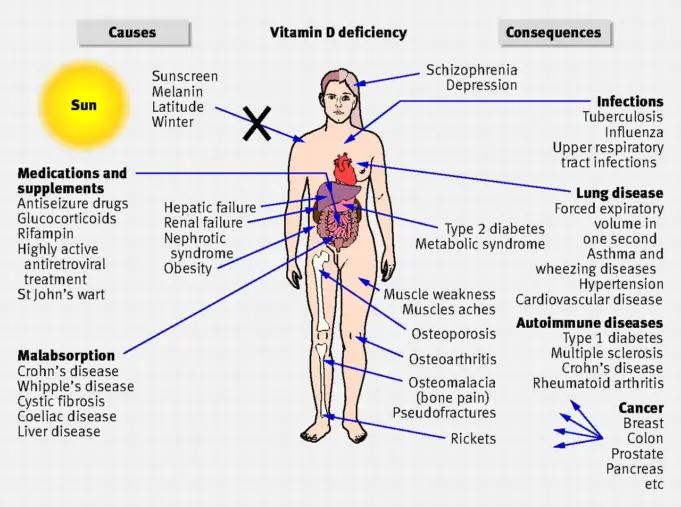It’s an undeniable fact that we need more calcium and vitamin D in our bodies. We can drink milk and eat dairy products, both of which have vitamin D and calcium in it, but some people can’t have that.
You can get vitamin D from getting some sun, too, but getting too much sun is really bad for you. Too much sun can negate vitamin D production. In either case, we still need vitamin D in our diets.
It’s important that we don’t have a deficiency in it because it can take a long time for the effects to be reverse – in some cases, it sticks with us forever. That is not something any of us want. Here are six identifiable factors that show us that we are vitamin D deficient.
Bone Pain and Fragility
Vitamin D is needed to help the calcium absorb into the body. You almost can’t have one without the other in this case. About 99 percent of calcium is stored in our bones and teeth and we need adequate amounts of calcium to keep our bones strong.
However, when you feel that you are weak in the bones and it is frail, it is a sign that your body needs more vitamin D to help absorb the calcium.
In turn it helps ward off osteoporosis, something found in senior citizens. As a child it is possible to have osteoporosis but they should not have to. When you have bone pain, you know how excruciating it can be.
Cardiovascular Diseases
These diseases are something anyone at any age wants to avoid. In regards to vitamin D and cardiovascular diseases, it often occurs as hypertension. Vitamin D in some regards helps to curb hypertension, especially in women. High stress and blood pressure are to be avoided at all costs.
Periodontal Disease
Your mouth and gums are important pieces of calcium storage. Vitamin D levels produce both defensins and cathelicidin, a particular compound that help lower the number of bacteria in the mouth.
This is especially important because the mouth is a major carrier and harbinger of multiple diseases and viruses. Even if we brush regularly and floss we are still susceptible to periodontal problems.
Periodontal issues can also be extremely expensive even with insurance because they require surgery or the use of high-tech equipment.
Kidney Failure or Lack of Functioning
Kidney function is an important part to the normal functioning of the body. It helps remove the waste from the body, balances the chemicals in the body, and helps regulate blood pressure.
Most importantly, it helps produce vitamin D. Everyone, regardless of age, needs vitamin D to help their kidneys to function and do what it needs to do.
Respiratory Issues in Children
This is very important to take note of. Studies have determined that a lack of vitamin D predisposes children to respiratory diseases. Vitamin D helps to reduce respiratory infections in children – and others who suffer from it.
Hair Issues
Hair becomes frail and “frizzy” if there is a vitamin D deficiency. Because hair grows on several parts of our body it is important to have adequate amounts to ensure that our hair maintains its shininess and its smoothness.
For many people vitamin D is something that is an afterthought. They get enough sun or drink enough milk to think they have their RDA (recommended daily allowance). Even at that, there is still a shortage involved that we should be aware of.
The six identifiable symptoms listed above are just six of the many symptoms of deficiency and it should not be ignored. A quick way to ensure that you are getting some vitamin D is sublingually (under the tongue).
Liquid D3 is an easy and fast way and it helps complement any diet that you are on to ensure you are getting the right amount of vitamin D. Simply drinking milk and eating dairy probably will not be enough to get the RDA of vitamin D – that and it holds a lot of calories, too.
Or it can be added to other beverages. Vitamin D deficiencies are cited in many health cases so it is necessary to have it.
It’s amazing how one of the most important vitamins we need is the most often neglected. Vitamin C, A, and B get a lot of love, but if individuals start getting their RDA of vitamin D they will see a significant change in their health and their mental status.
People of all ages need vitamin D, some more so than others but in any case there needs to be the right amount at all times and sublingually it is the easiest to take and the fastest to absorb.












